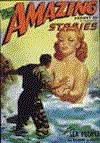|
|
|
Plenty of superheroes, but where is the sci-fi? December 18, 2003 By Franklin Harris While other industry watchers wonder why comic book publishers have such a hard time reaching non-geeks, I wonder why it reaches so few geeks. Most comic book conventions are multi-purpose, catering not only to superhero fans, but also to fans of sci-fi, horror and fantasy. Fans of all these genres and their various subgenres seem to play well together. So, why do American comic book publishers have such a hard time selling sci-fi comics? You would think that there would be enough overlap between the audience for superheroes and the audience for science fiction to keep SF comics viable. But apart from movie tie-ins, like "Star Wars" and "Aliens," there are almost no SF comics on the stands, not counting a few Japanese comics like "Planetes" and "Mobile Suit Gundam." And some media tie-ins have a hard time surviving. "Star Trek" can sustain an empire of mass-market paperback books, but it has been unable to maintain an ongoing comic book series since 1996. In the late 1940s and through the '50s, sci-fi comics were a major part of the comics landscape. Titles included "Planet Comics," "Space Adventures" and "Captain Science," all of which followed the "Flash Gordon" model of sci-fi. But as the overall market for comics imploded in the '60s, sci-fi comics joined westerns and romance comics on the outs. The Age of Superheroes began in earnest. Maybe part of the problem for sci-fi comics was that the superheroes co-opted so many SF concepts. Superman was always a "strange visitor from another planet," but now he was joined by many more. Hawkman was revived as an alien policeman. Green Lantern became part for a universe-spanning corps of heroes. Even Superman's younger self, Superboy, got into the act, travelling into the future to fight evil as a member of the Legion of Superheroes. Since the '60s, sci-fi comics have struggled to find a place amid the capes and spandex. The '70s could be seen as a bright spot. Marvel Comics increased the number of titles it published, and sci-fi comics were a big part of the new wave. But Marvel's output was based mostly on properties from other media: "Star Wars," "Battlestar Galactica," "Killraven" (based on "The War of the Worlds"), "Logan's Run," "John Carter: Warlord of Mars" and even the legendary Jack Kirby's version of "2001: A Space Odyssey." But of these, only "Star Wars" and "John Carter" had lengthy runs. The '80s also saw its share of SF comics, which were part of the explosion in the number of independent publishers. But as those publishers went out of business, their comics were forgotten, with the exception of a few favorites like Mike Baron and Steve Rude's "Nexus." And even "Nexus," last published by Dark Horse Comics, can't sell enough copies nowadays to stay profitable. DC Comics tried original SF material in 1997 with its Helix imprint. Unfortunately, Helix Comics never took off. Its one successful title, "Transmetropolitan," shifted to DC's Vertigo imprint, while the others met with swift cancellation. Currently, neither Marvel nor DC publishes straightforward SF comics. Horror comics have experienced similar ups and downs. The advent of the Comics Code in the 1950s killed off EC Comics and its popular line of horror titles. DC and Marvel tried out their own horror books in the late '60s and early '70s, but most of those titles were canceled by the '80s. Now, however, between Dark Horse and IDW Publishing, and because of one popular writer, Steven Niles, horror comics are back. Perhaps all the new horror titles are a fad, and perhaps they're not. But either way, maybe it's time SF comics got a similar shot at recapturing their former glory. |

RECENT COLUMNS
Order a helping of Cartoon Network's 'Robot Chicken'
03/31/05
Campaign against video games is political grandstanding
03/24/05
Prize-winning author is 'Wrong About Japan'
03/17/05
Censored book not a good start
03/10/05
Some superhero comics are for 'fanboys' only
03/03/05
'Constantine' does well with its out-of-place hero
02/24/05
'80s publisher First Comics' legacy still felt
02/17/05
Director's cut gives new 'Daredevil' DVD an edge
02/10/05
Put the fun back into 'funnybooks'
02/04/05
Is 'Elektra' the end of the road for Marvel movies?
01/27/05
'House of Flying Daggers' combines martial arts and heart
01/20/05
Anniversary edition of 'Flying Guillotine' has the chops
01/13/05
Movie books still have role in the Internet era
01/06/05
Looking ahead to the good and the bad for 2005
12/30/04
The best and worst of 2004
12/23/04
'Has-been' Shatner is a 'transformed man'
12/16/04
© Copyright 2005 PULP CULTURE PRODUCTIONS
Web site designed by Franklin Harris.
Send feedback to franklin@pulpculture.net.